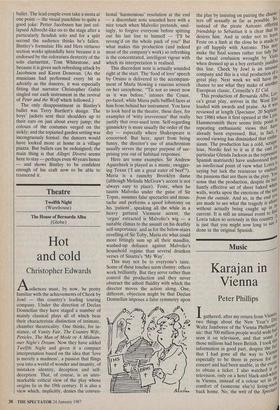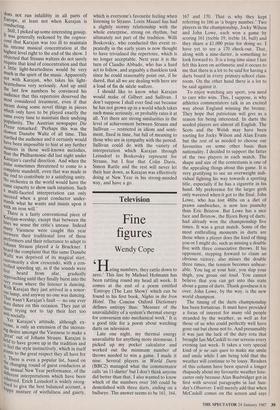Music
Karaj an in Vienna
Peter Phillips Igathered, after my return from Vienn° two things about the New Year's Da' Waltz Jamboree of the Vienna PhilhartWj nic: that 700 million people world-wide ha1-1 t seen it on television, and that some those millions had been British. I took til' information in good part, despite the fa` that I had gone all the way to Vle°,11: especially to be there in person for l'''t concert and had been unable, in the event, to obtain a ticket. I also watched it 0, television, only on a hotel black-and-Whitt` in Vienna, instead of a colour set in the comfort of (someone else's) living-gaiel, jiback home. No, the writ of the SpectaP does not run infallibly in all parts of Europe, at least not when Karajan is Conducting. Still, I picked up some interesting gossip. It was generally reckoned by the cognos- centi that Karajan was too ill to maintain his intense musical concentration at the highest level right to the end of the show. I objected that Strauss waltzes do not surely require that kind of concentration and that a little light-heartedness would be very Much in the spirit of the music. Apparently not with Karajan, who takes his light- heartedness very seriously. And up until the last few numbers he convinced his audience that this repertoire deserved the most considered treatment, even if that meant doing some novel things in pieces Which only have to be played exactly the same every time to maintain their undying Popularity. The Austrian newspaper Die Presse remarked: 'Perhaps this was the slowest Danube Waltz of all time. This startled the audience and it certainly would have been impossible to hint at any further nuances in those well-known melodies, than the Philharmonic did last night under karajan's careful direction. And when the Pulse sometimes threatened to come to a complete standstill, even that was made in No end to contribute to a satisfying unity. No orchestra in the world would have the same capacity to show such intuition. Such a multi-faceted interpretation can only succeed when a great conductor under- stands what he wants and insists upon it With an iron will.' There is a fairly conventional piece of Karajan-worship; except that between the lines we sense the critic's unease. Indeed between Viennese were caught this year uetween their traditional love of these Performers and their reluctance to adapt to Johann Strauss played a la Bruckner. I heard the complaint that this same Danube Waltz was deprived of its magical start, customarily a slow crescendo, with a con- trolled speeding up, as if the sounds were first heard from afar, gradually aPproaching until they finally burst into the room where the listener is dancing. with Karajan they just arrived in a sonor- ous lump, and anyway no one was dancing. That wasn't Karaj an's fault — no one ever does dance on this occasion. They just sit there trying not to tap their feet too Yet Karajan's attitude, although ex- treme, is only an extension of the increas- 71 desire amongst the Viennese to make a teat' out of Johann Strauss. Karajan is ld to to have grown up in the tradition and !eel the style instinctively, which in itself Po ints to the great respect they all have for 1:t There is even a popular list, based on " ,41,e changing round of performance, conuctors at ,,Us annual New Year o of the ulfferent interpretations which have been achieved. Erich Leinsdorf is widely recog- nised to give the best balanced account, a aPPY mixture of wistfulness and gaiety, which is everyone's favourite feeling when listening to Styauss. Lorin Maazel has had a slightly stormy relationship with the whole enterprise, strong on rhythm, but ultimately not part of the tradition. Willi Boskovsky, who conducted this event re- peatedly in the early years is now thought to have trivialised the repertoire, which is no longer acceptable. Next year it is the turn of Claudio Abbado, who has a hard act to follow, and arguably a thankless task since he could reasonably point out, if he dared, that all we are dealing with here are a load of fin de siècle waltzes.
I should like to know what Karajan would make of Gilbert and Sullivan. I don't suppose I shall ever find out because he has not grown up in a world which takes such music seriously, or probably rates it at all. Yet there are strong similarities in the level of achievement between Strauss and Sullivan — restricted in idiom and senti- ment, fixed in time, but full of meaning to those who are in sympathy with the period. Sullivan could do with the variety of interpretation which Karajan through Leinsdorf to Boskovsky represent for Strauss, but I fear that Colin Davis, Simon Rattle and the rest will never let their hair down, as Karajan was effectively doing at New Year in his strong-minded way, and have a go.



















































 Previous page
Previous page